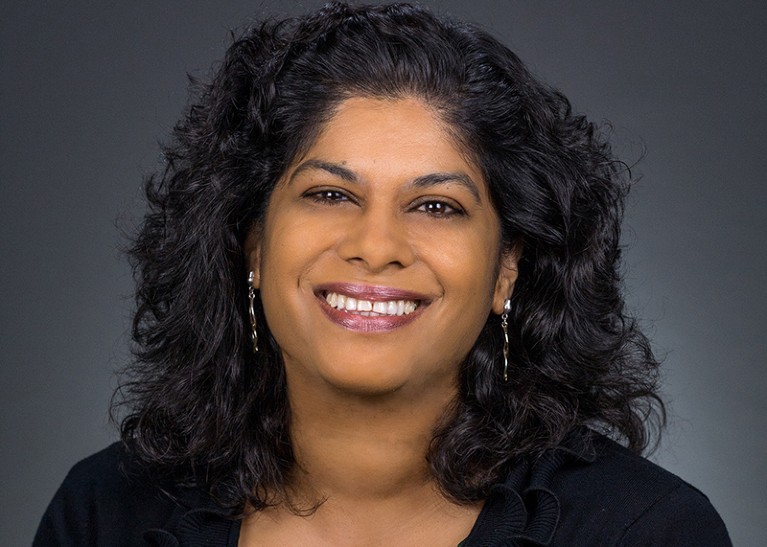
Ashani Weeraratna.Credit: The Wistar Institute
Born in Sri Lanka, Ashani Weeraratna was raised in Lesotho in southern Africa and moved to the United States in 1988 to pursue an undergraduate science degree. Now a skin-cancer researcher at the Wistar Institute in Philadelphia, Pennsylvania, she has experienced harassment during her three decades in the country. An escalation in incidents prompted her to address a rally protesting against family separations.
Describe your most recent experience of harassment.
In April, I was in a grocery checkout line when someone told me that people like me are from shithole countries and live like animals. In January, I posted on Twitter about being a principal investigator and mentor, and someone asked why I was not taking my science back to my home country. I explained that I am a citizen, that I think the United States is the best place to do science, and that my husband and daughter also live here. The person told me I should leave jobs available for US postdocs. I blocked her when she took a screenshot of my profile photo and one of me with my daughter, whom she referred to as an ‘anchor baby’ (a pejorative term used to describe a child born in a country with birthright citizenship to a non-citizen mother).
Was the harassment different before the change in US administration in January 2017?
As a more-junior scientist, I thought of myself as an overlooked voice — a woman of colour doing science. It wasn’t so much harassment before then as it was not being taken seriously. There were instances, for example after the terrorist attacks on 11 September 2001, when a couple of random people spat at me and said horrible things like, “Go home, dirty Arab.” I tried not to let it bother me back then. It’s different now, though, because I have a biracial daughter to protect.
How did you come to speak at a pro-immigration rally?
The Trump administration’s policies — including the ban on travel from some Muslim-majority countries and possibly rescinding the visas that allow spouses of immigrants to work — are affecting science. Border policies that separate families and incarcerate children, as well as the dehumanizing, divisive language, also bother me. I had one talented collaborator from Syria who was at Wistar for four years on a work visa. But now her visa keeps getting denied. When our Democratic state senator, Daylin Leach, asked me to speak at a rally on 30 June to support immigrants and protest against family separations, I had to think about it. But I decided the public needed to understand that these policies hugely affect biomedical research. More than 40% of the US cancer-research workforce is made up of immigrants. At Wistar, 289 employees are from more than 20 different countries.
Were you concerned about participating?
I worried that, by speaking out, I could jeopardize my federal grants, which support my lab, my students and my institute. I received legal advice that as long as I spoke as a private citizen, I’d be fine. I also talked it over with my husband, a cautious person, who said I needed to be on the right side of history.
What was the reaction to your speech?
The positive response was overwhelming. I posted a video of my talk on Facebook and friends encouraged me to make it public. It’s had more than 4,000 views so far.
What did you share at the rally?
I grew up in landlocked Lesotho. To get medical training, I would have had to go to South Africa, a country that had apartheid and was segregated in the 1980s. I saw limited opportunities to pursue my dream of being a cancer researcher as a woman of colour there. When I came to the United States for college, to my mind, the country was a bastion of free speech and a great melting pot. To feel like that’s being reversed so quickly is frightening and discouraging. I implored politicians to do what they can to ensure that the American dream doesn’t become an American nightmare.

 Visa policy: Access denied
Visa policy: Access denied
 Meet the scientists affected by Trump’s immigration ban
Meet the scientists affected by Trump’s immigration ban
 Political expatriate
Political expatriate





